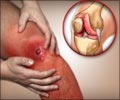Researchers are reporting that a small protein named GILZ appears to protect against the bone loss in arthritis.

Now they have early evidence that GILZ might one day be a better treatment option for arthritis patients than widely used synthetic glucocorticoids, which actually increase bone loss, said Dr. Xingming Shi, bone biologist at the Medical College of Georgia at Georgia Regents University.
Their research is being presented at The American Society for Bone and Mineral Research 2014 Annual Meeting Sept. 12-15 in Houston.
In addition to bone loss, glucocorticoids, such as prednisone, produce other side effects, including diabetes. While GILZ is induced by glucocorticoids, directly overexpressing the protein appears to better target sources of bone loss and inflammation and avoid these serious side effects. .
For this study, the focus was tumor necrosis factor alpha, a proinflammatory cytokine that helps regulate immune cells and is a major player in arthritis. Tumor necrosis factor alpha primarily works though promoting inflammation, which is great if the target is cancer. However, when tumor necrosis factor alpha becomes dysregulated, it can also cause diseases like arthritis and inflammatory bowel disease.
To look specifically at the impact on bone loss, the researchers crossed mice bred to overexpress tumor necrosis factor alpha throughout the body with mice that overexpressed GILZ in just their mesenchymal stem cells. These stem cells produce the osteoblasts, which make bone. They also make fat, and when the cells stop making as much bone, they tend to make more of it. Shi's lab has shown that GILZ can coax mesenchymal stem cells back to making more bone and less fat.
Advertisement
"Our previous studies have shown that the GILZ transgenic mouse can make more bone," said Dr. Nianlan Yang, MCG postdoctoral fellow. "We wanted to see if GILZ would still have a bone protective effect in an inflammatory environment similar to arthritis."
Advertisement
Glucocorticoids and GILZ are both produced naturally in the body. Glucocorticoids are steroid hormones that help regulate the body's use of the fuel glucose and dampen the immune response.
Source-Eurekalert















